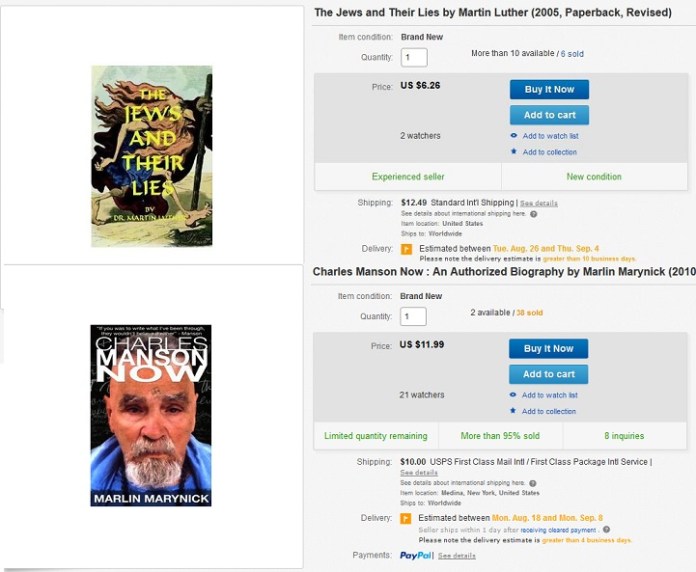It was recently reported that eBay started removing Burzum items from their website, arguing that they promote hatred and violence. If this is true, then in the near future no Burzum and Varg Vikernes-related items will be available for purchase through this auction site.
Before you get your panties in a bunch, let’s get something clear. eBay is a business; they’re not a government agency, an NGO, a charity or a social program. As such, their first duties are to their stockholders, and they are under no obligation to list everything under the sun. Even though there will be many who will bring up the issue of “Freedom of Speech” and even the 1st Amendment (which would only be valid in the case of the United States anyway) the fact of the matter is that as a private entity eBay has the right to decide not to list some things, just like your local book store might choose not to carry the Unabomber’s manifesto, or a golf club might demand you dress like an insufferable asshole before you step a foot inside.
Although this could be the end of the article, after all, I’m sure that there are plenty of people who would like to silence Varg for good, I’m afraid that things aren’t that simple. You see, even though eBay has the right to act in the way they’re acting, I think that doing so is a morally wrong decision, as well as a behavior that represents a risk for the spread of arts in general.
When studying the issue of Freedom of Speech one often encounters the phrase “chilling effects”. In essence, it refers to behaviors, be it regulatory or private, that can instill fear in the hearts of people, so as to prevent them from spreading a certain information or knowledge. A good example is that of copyrighted material on the internet, where websites are quick to comply with takedown notices (thus affecting the right of free speech of those whose information was taken down) in order to avoid millionaire litigation costs. In the private realm the same happens when speech is restricted because of the fear of violence; for example, after the murders and terrorist attacks “caused” by the publication of cartoons of Mohammed in a Danish newspaper, nobody dared touching the issue of Islam from a satirical point of view, to the point that even a South Park episode ended up being censored… ironically, an episode dealing with censorship about Mohammed.
Music is also affected by things like these. In the United States, for example, artists like Marilyn Manson faced big problems when their record companies realized that their albums would not be carried by retailers such as Wal-Mart due to the “offensive” nature of his lyrics and cover art. While, of course, for an artist like Marilyn Manson this is hardly a problem, and he can probably exploit it to his benefit, newer artists might find themselves less likely to be signed to a record label if the latter feels that their kind of “offensive speech” would be hard to sell not only in brick-and-mortar stores, but also in online retailers. After all, if eBay drops a band, what’s there to stop Amazon from doing the same?
“License printers, and it matters little whether authors are still free to write. Restrict the sale of books, and it matters little who prints them. Predictably, repressive regimes have exploited these principles by attacking all levels of the production and dissemination of ideas.”
The case of Burzum and eBay is also interesting because it shows a difficulty for the retailer to differentiate between the “art” and the “artist”. Although nobody can deny that Varg is a racist, his music does not convey that message; Varg’s music is not White Power rock, nor is it made up of some sort of pro-terrorist chants. Although after Varg’s shameful conviction for speech crimes in France it is easy to target him for different degrees of censorship and repression, transforming him into a pariah and trying to eliminate his presence in the music world is not the right course of action.

When it comes to free speech I’m what’s known as an absolutist: I think that there should be virtually no limitations on what people are allowed to think, say or print. In the immortal words of Christopher Hitchens, “The right of others to free expression is part of my own. If someone’s voice is silenced, then I am deprived of the right to hear. Moreover, I have never met nor heard of anybody I would trust with the job of deciding in advance what it might be permissible for me or anyone else to say or read. That freedom of expression consists of being able to tell people what they may not wish to hear, and that it must extend, above all, to those who think differently is, to me, self-evident.”
True, eBay has the right to do what they did. The problem is that they’re not right in doing so.

